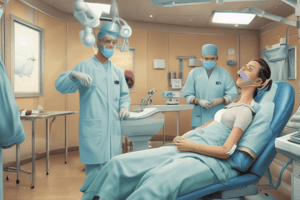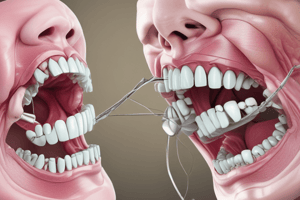Podcast
Questions and Answers
What is an advantage of maxillary alveolar cortical plates of bone?
What is an advantage of maxillary alveolar cortical plates of bone?
- Easy expansion on the application of pressure (correct)
- Difficulty in extraction of maxillary teeth
- Decreased healing rate of the alveolar sockets
- Multiple complications after extraction
What is characteristic of maxillary alveolar cortical plates of bone?
What is characteristic of maxillary alveolar cortical plates of bone?
- Thick cortical plates
- Thin cortical plates (correct)
- Difficulty in expanding on the application of pressure
- Low vascularity
What is a disadvantage of mandibular alveolar cortical plates of bone?
What is a disadvantage of mandibular alveolar cortical plates of bone?
- Easy extraction of mandibular teeth
- Fast healing rate of the alveolar sockets
- Minimum complications after extraction
- Difficulty in expansion on the application of pressure (correct)
What is a characteristic of mandibular alveolar cortical plates of bone?
What is a characteristic of mandibular alveolar cortical plates of bone?
What happens to the healing rate of the alveolar sockets after extraction of maxillary teeth?
What happens to the healing rate of the alveolar sockets after extraction of maxillary teeth?
What happens to the healing rate of the alveolar sockets after extraction of mandibular teeth?
What happens to the healing rate of the alveolar sockets after extraction of mandibular teeth?
What is the correct grip for holding mandibular dental extraction forceps?
What is the correct grip for holding mandibular dental extraction forceps?
Which type of grasp is recommended for maxillary teeth?
Which type of grasp is recommended for maxillary teeth?
What is the primary function of the non-dominant hand during exodontia?
What is the primary function of the non-dominant hand during exodontia?
What is one of the benefits of supporting the mandible during extraction of mandibular teeth?
What is one of the benefits of supporting the mandible during extraction of mandibular teeth?
What type of grasp is recommended for mandibular teeth?
What type of grasp is recommended for mandibular teeth?
What is the role of the non-dominant hand in providing tactile information during extraction?
What is the role of the non-dominant hand in providing tactile information during extraction?
What is the characteristic of the buccal alveolar plate of bone of mandibular 2nd molar and 3rd molar?
What is the characteristic of the buccal alveolar plate of bone of mandibular 2nd molar and 3rd molar?
What is the characteristic of the buccal alveolar plate of bone of mandibular anterior teeth, premolars, and 1st molar?
What is the characteristic of the buccal alveolar plate of bone of mandibular anterior teeth, premolars, and 1st molar?
What is the reason for the increased thickness of the buccal alveolar plate of bone of mandibular 2nd molar and 3rd molar?
What is the reason for the increased thickness of the buccal alveolar plate of bone of mandibular 2nd molar and 3rd molar?
What is the relationship between the buccal and lingual alveolar plates of bone in mandibular 1st molar?
What is the relationship between the buccal and lingual alveolar plates of bone in mandibular 1st molar?
What is the term used to describe the force used for extracting mandibular teeth?
What is the term used to describe the force used for extracting mandibular teeth?
Who is the professor mentioned in the text?
Who is the professor mentioned in the text?
What is the process of removing a tooth from its socket similar to?
What is the process of removing a tooth from its socket similar to?
Why is the rotational mesiodistal movement used for extracting a lower 2nd premolar?
Why is the rotational mesiodistal movement used for extracting a lower 2nd premolar?
What is the main reason for avoiding excessive buccal or lingual pressure during tooth extraction?
What is the main reason for avoiding excessive buccal or lingual pressure during tooth extraction?
Which tooth has a conical shape and round cross-section?
Which tooth has a conical shape and round cross-section?
What is the general pattern of the thickness of the buccal and palatal alveolar plates of bone in maxillary teeth?
What is the general pattern of the thickness of the buccal and palatal alveolar plates of bone in maxillary teeth?
What is the potential consequence of using excessive buccal or lingual pressure during tooth extraction?
What is the potential consequence of using excessive buccal or lingual pressure during tooth extraction?
Which of the following maxillary teeth has a thicker palatal alveolar plate of bone compared to the buccal alveolar plate?
Which of the following maxillary teeth has a thicker palatal alveolar plate of bone compared to the buccal alveolar plate?
Why is the extraction of an upper central incisor done with a specific technique?
Why is the extraction of an upper central incisor done with a specific technique?
What is the relationship between the thickness of the buccal alveolar plate and the palatal alveolar plate in the 1st molar?
What is the relationship between the thickness of the buccal alveolar plate and the palatal alveolar plate in the 1st molar?
Which of the following statements is true about the alveolar plate of bone in maxillary teeth?
Which of the following statements is true about the alveolar plate of bone in maxillary teeth?
What is the pattern of the thickness of the buccal and palatal alveolar plates of bone in the 2nd molar?
What is the pattern of the thickness of the buccal and palatal alveolar plates of bone in the 2nd molar?
What is the general trend of the alveolar plate of bone in maxillary teeth?
What is the general trend of the alveolar plate of bone in maxillary teeth?
Flashcards are hidden until you start studying
Study Notes
Maxillary Teeth
- Thickness of buccal alveolar plate of bone is thinner than palatal alveolar plate of bone in all maxillary teeth.
- Central incisor, lateral incisor, canine, 1st premolar, 2nd premolar, 1st molar, and 2nd molar have thinner buccal alveolar plates and thicker palatal alveolar plates.
- 3rd molar has a thinner buccal alveolar plate.
Maxilla and Mandible
- Maxilla has:
- Thin alveolar cortical plates of bone
- More sponge bone
- Increased vascularity
- Mandible has:
- Thick cortical plates of bone
- Less spongy bone
- Decreased vascularity
Extraction of Maxillary Teeth
- Maxillary teeth have:
- Easy expansion of the alveolar sockets
- Faster healing rate with minimal complications
Extraction of Mandibular Teeth
- Mandibular teeth have:
- Difficult expansion of the alveolar sockets
- Slower healing rate with multiple complications
- Mandibular dental extraction forceps must be held in a 'palm down' position.
- Pinch grasp is used for maxillary teeth.
- Sling grasp is used for mandibular teeth.
Role of Opposite Hand
- The opposite hand is used for:
- Reflection and/or retraction of the surrounding soft tissues
- Supporting the mandible during extraction of mandibular teeth
- Supporting the alveolar process, providing tactile information regarding expansion of the socket walls
Mandibular Teeth
- Thickness of buccal alveolar plate of bone is thinner than lingual alveolar plate of bone in mandibular anterior teeth, premolars, and 1st molar.
- The buccal alveolar plate of bone of mandibular 2nd molar and 3rd molar is thicker than the lingual alveolar plate of bone due to the presence of the external oblique ridge.
Primary Extraction Movement
- Primary extraction movement (pressure or force) for extracting mandibular teeth involves expansion of the bony socket.
Indications of Rotational Mesiodistal Movement
- Indications of rotational mesiodistal movement (pressure) include:
- Extraction of lower 2nd premolar
- Extraction of upper central incisor
Precautions
- Excessive buccal or lingual pressure must be avoided to prevent:
- Fracture of the alveolar plates of bone
- Fracture of the apical portion of the root
Studying That Suits You
Use AI to generate personalized quizzes and flashcards to suit your learning preferences.




